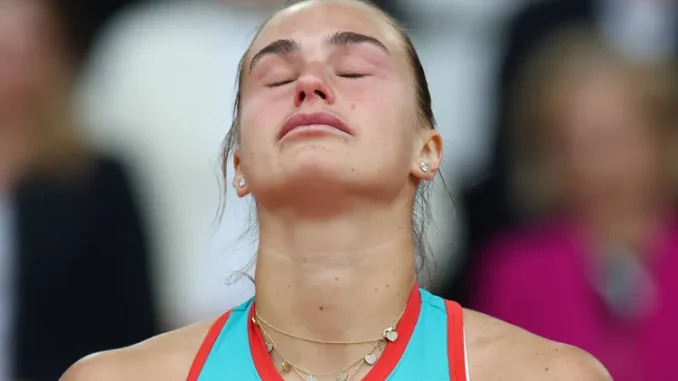
The 2025 Wimbledon Championships left an indelible mark on Aryna Sabalenka, not for a triumphant victory but for a raw, unfiltered glimpse into the emotional crucible of professional tennis. The world No. 1, a three-time Grand Slam champion, bared her soul after a gut-wrenching 6-4, 4-6, 6-4 semifinal loss to Amanda Anisimova on July 10, 2025, at Centre Court. In a candid YouTube vlog, Sabalenka’s voice cracked as she packed her bags, her words heavy with self-doubt: “I am going to be there on the beach thinking it’s so beautiful, but I lost. I am such a loser. I hate myself.” This stark admission, coupled with her reflections on the relentless highs and lows of the sport, has resonated deeply, shedding light on the mental battles faced by even the game’s brightest stars.
Sabalenka’s 2025 season has been a testament to her dominance and resilience, yet also a reminder of her vulnerability. With a 35-4 record across six main draws and finals appearances at the Australian Open and French Open, the 27-year-old Belarusian has been a model of consistency, reaching the semifinals or better in nine of her last ten Grand Slams. However, her Wimbledon defeat marked her third consecutive semifinal exit at the All England Club, a recurring heartbreak that has fueled what she calls a “hate relationship” with the tournament. “I lost three semis, three tough ones. Then I was banned from playing [in 2022]. Then I was injured,” she said, referencing her 2024 withdrawal due to a shoulder injury and the 2022 ban due to her nationality. Despite these setbacks, she remains hopeful, adding, “I really hope that one day I will turn it around and have [that] love relationship.”
The match against Anisimova was a clash of powerhouses, with both players known for their aggressive, big-hitting styles. Sabalenka, who typically overpowers opponents, met her match in the 13th-seeded American, who played with fearless precision. “She was more brave today,” Sabalenka admitted, acknowledging Anisimova’s edge in critical moments. A double fault in the first set and an errant forehand smash in the third, which handed Anisimova a 3-1 lead, were pivotal errors that Sabalenka later lamented. “Sometimes I was just stopping my arms, making mistakes which I shouldn’t be making,” she said, reflecting on moments where her mental lapses cost her dearly. Anisimova’s victory, her first Grand Slam final berth, was a testament to her resurgence after a mental health hiatus, and Sabalenka graciously noted, “She was the better player.”
Tensions flared during the match, adding to its drama. Sabalenka was visibly frustrated when Anisimova let out a shout mid-point, interpreting it as a premature celebration. “She was already celebrating it. I was, like, ‘That’s a bit too early,’” Sabalenka said, admitting it “pissed me off” but also spurred her to fight harder. Another flashpoint came when Anisimova’s net-cord winner went unacknowledged with the customary apology, prompting Sabalenka to remark, “I was like, ‘You don’t want to say sorry?’ She just wanted, I guess, badly to win this match.” Despite these moments, the two shared a warm embrace at the net, a gesture that contrasted with Sabalenka’s fiery on-court demeanor.
Sabalenka’s emotional candor stems from lessons learned after her controversial French Open final loss to Coco Gauff in June 2025. Her post-match comments then, suggesting Gauff won due to her errors rather than superior play, drew widespread criticism. Determined to avoid a repeat, she took extra time before her Wimbledon press conference to compose herself. “I just don’t want to face that hate again,” she said, emphasizing her effort to stay grounded. “Every time I was close to completely losing it and start yelling, screaming, smashing the rackets, I kept reminding myself that’s not an option.” Her self-awareness reflects growth, shaped by the backlash and her subsequent apology to Gauff, with whom she later collaborated on lighthearted social media posts.
The broader context of Sabalenka’s reflections reveals the relentless pressure of professional tennis. “It’s so f—— annoying about being an athlete, honestly. All your life depends on your result,” she said in her vlog, capturing the sport’s unforgiving nature. “You win and you are the happiest person that you can be. But when you lose it’s just tough to enjoy.” This emotional rollercoaster, intensified by her personal history—including the loss of her father in 2019—has shaped her journey. As she prepares for the US Open, where she won in 2024, Sabalenka’s resolve remains unshaken. “I never give up, and I’m going to come back stronger, for sure,” she vowed, her words a beacon of hope amid the sport’s grueling demands.
Leave a Reply